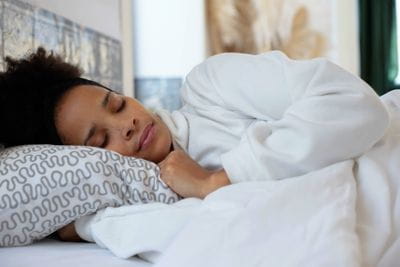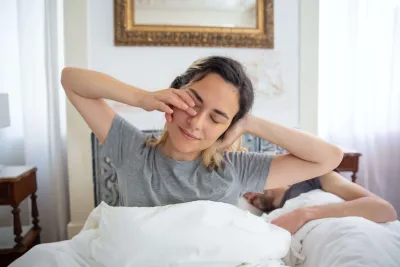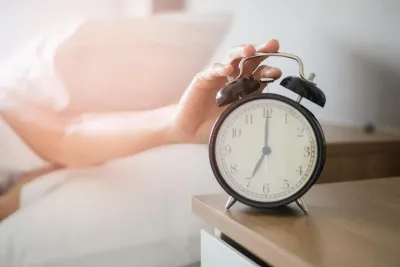How to Increase Deep Sleep Naturally
Ana Marie Schick: Resident Sleep Expert and Certified Health Coach • Apr 22, 2024

Key Takeaways
Improving deep sleep comes from steady routines, the right sleep environment, and habits that help your body fully power down at night.
- Keeping a consistent bedtime and wake-up time supports your circadian rhythm and makes deep sleep easier to reach.
- A cool, dark, quiet bedroom—paired with a supportive mattress and temperature control tools like the Chilipad—helps create ideal conditions for deep sleep.
- Evening choices matter. Cutting back on screens, heavy meals, and stimulants before bed helps your body settle faster.
- Regular daytime movement supports longer, higher-quality deep sleep by helping your body build healthy sleep pressure.
- Relaxation habits such as meditation, slow breathing, or reading help calm stress and prepare your mind for restorative rest.
Are you struggling to achieve that deep, restorative sleep your body craves? You're not alone. In our fast-paced, tech-driven world, getting quality, deep sleep has become more challenging than ever.
Deep sleep is an important part of nightly sleep that helps sleepers feel refreshed. When we track our sleep with either a wearable or non-wearable sleep tracker, we can see our nightly sleep cycles, including our amount of deep sleep. But do we really know what that information means, why it's important, and how to improve it if it is too low?
But fear not—below, we'll examine the importance of deep sleep for overall health and provide you with various tips and tricks to enhance the quality of your sleep. We've got you covered on how to improve deep sleep from, creating the perfect sleep environment to understanding how lifestyle choices impact your sleep cycle.
Understanding Deep Sleep
Deep sleep, a vital component of our sleep cycle, is essential for physical restoration, mental health, and overall well-being. This stage of sleep, characterized by slow brain waves and a state of deep relaxation, is when the body repairs muscles, strengthens the immune system, and consolidates memories.
Impaired memory: Deep sleep helps form long-term memories.
Importance of Deep Sleep
However, achieving deep sleep has become a challenge for many in our technology-filled world. Understanding how much deep sleep is is crucial, as it helps you feel refreshed in the morning and plays a significant role in long-term health and cognitive function. Read our previous blog, Understanding Deep Sleep, to learn more about deep sleep and why it's important.
Sleep Stages: Stage 3 of non-rapid eye movement (NREM) sleep is often called "deep sleep" as it provides high-quality rest that refreshes people upon waking up. During deep sleep, the sleeper's heart rate, breathing, and brain waves all slow down while their muscles become relaxed. Most deep sleep typically occurs during the first half of the night.
Additionally, There are no established guidelines regarding the required amount of deep sleep for an individual. However, most adults spend approximately 10% to 20% of their sleep in deep sleep.
Tips for Getting More Deep Sleep
If you want to improve your lack of deep sleep, you’re in luck. There are various ways to improve the length of deep sleep one gets during their sleep cycle. One way is to eliminate or reduce certain factors that delay deep sleep.
Deep Sleep Statistic: The amount of deep sleep you need varies by age. [1] As a person ages, they spend less time in the deep sleep stage. Other factors that influence the amount of deep sleep we get can be attributed to gender and race. [2]
Some people may need to make significant lifestyle changes to improve their deep sleep, while others can make simpler adjustments.
Below, we’ll discuss ways to increase restful sleep naturally and how to improve it with the following helpful tips.
Sleeping Tip: Learn how to boost your deep sleep by listening to sleep podcasts where experts break it all down in these top-rated podcasts.
Unlock Deep Sleep with Chilipad Dock Pro
Experience better sleep with our bed cooling systems and cooling mattress toppers. You can easily adjust your bed temperature, which ranges from 55-115ºF.
Sleeping Cooler at Night
Using a Bed Cooling System
Using a Bed Cooling System to cool the bed’s temperature can help a person achieve more deep sleep. This doesn’t mean that they have to go to sleep in a freezing cold bed to get the benefits of cool sleep. We recommend starting the night off in a warm, cozy bed and then scheduling a drop in the temperature once you are already asleep.
The most important thing you can do when using a Chilipad Dock Pro, a mattress cooling system, is to schedule a drop in temperature soon after the desired sleeping time. A significant change in your body temperature—even if it’s only .1 degrees—goes a long way toward making sure you sleep deeper for longer.
Did You Know: Breathable bedding and pajamas made from cotton, Tencel®, or bamboo can help you sleep cooler at night. Sleepme offers a host of soft goods that are made from cooling fabrics for the bed.
Create a Healthy Sleep Environment
Making Your Bedroom Dark, Quiet, and Reaxing
Getting sufficiently deep sleep can be difficult for people experiencing pain or discomfort. Achieving the best quality sleep possible requires creating an optimal sleeping environment that is both comfortable and conducive to sleep.
Read More: To enhance your understanding and approach to achieving more deep sleep, visit our blog: What is Sleep Hygiene and Why It's Important.
One key factor in creating a good sleeping environment is making it dark, quiet, and relaxing. This can be achieved through various methods, such as investing in ear plugs, sleeping masks, noise machines, or black-out curtains. These tools can be beneficial for individuals who live in noisy or brightly lit areas, as they can help block out unwanted noise and light, allowing for restful sleep.
Limit Exposure to Bright Lights
Reducing Screen Time Before Bed
To promote deep sleep, limit screen time before bed. Blue light from devices like smartphones, tablets, and computers can interfere with your sleep patterns, resulting in not getting enough deep sleep.
Blue light significantly inhibits melatonin production, a hormone that signals to our body it's time to sleep. This disruption can lead to difficulty falling asleep and shift our body's natural circadian rhythm, resulting in a less restorative sleep cycle.
Read More: Blue Light and Its Impact on Sleep: What You Need to Know
Plus, sleep quality can be compromised, as reduced melatonin levels often lead to lighter sleep phases and more frequent awakenings. Improve sleep quality can be done by reducing screen time before bed and engaging in relaxing activities like reading or listening to music.
If necessary, using "night mode" settings on devices or blue light filtering glasses can help reduce exposure to blue light.
Maintain a Healthy Diet
Paying attention to your diet, especially the timing of your last meal, can significantly improve the quality of your sleep. How is that? Eating a heavy or large meal just before bed can lead to discomfort and indigestion, disrupting your sleep.
Finishing large meals at least two to three hours before you sleep is recommended, giving your body adequate time to digest. If you're feeling hungry closer to bedtime, select lighter snacks that won't upset your stomach or elevate your blood sugar levels, including a small bowl of whole-grain cereal with milk, a banana, or a handful of raw nuts.
Also, moderating your fluid intake in the evening is key. It is important to stay hydrated, but drinking excessive amounts of water before bedtime can lead to frequent urination during the night, resulting in less deep sleep. Try to monitor your hydration throughout the day, drink more fluids earlier in the day, and reduce your intake before bedtime.

Regular Exercise
Benefits of Morning and Afternoon Exercise
Staying physically active plays a big role in promoting quality sleep, but timing and intensity are important. Regular exercise, especially in the morning or afternoon, can improve the quality of your sleep. Exercise raises your body temperature and increases the production of endorphins, which make you feel more awake and alert.
However, as the day progresses, your body temperature naturally drops, signaling to your brain that it's time to wind down and prepare for sleep. When you exercise in the morning or afternoon, you align this natural cycle of boosted alertness and subsequent relaxation with your body's internal clock, thereby enhancing your ability to sleep more easily at night.
Studies reveal that individuals who work out 2.5 hours per week [3] are twice as likely to get a better night's sleep. Further, individuals who work out for 30 minutes of mild to moderate exercise may see a difference in sleep quality the same night.
However, vigorous exercise late in the evening can have the opposite effect. Intense physical activity elevates your heart rate and body temperature and can increase alertness, all of which are counterproductive when trying to wind down for a good night's sleep.
But if evening workouts are your only option, why not try gentler, more relaxing activities such as yoga or a leisurely walk? These can still contribute to your overall physical activity without disrupting your sleep cycle.
Did You Know: A little holiday yoga can help melt away stress and anxiety, letting your body unwind and boosting your chances of deeper sleep.
Exercise improves your physical health and helps regulate your sleep patterns, contributing to deeper and better quality sleep.
Perform Relaxation Techniques
Embracing relaxation techniques can significantly elevate the quality of your sleep. Engaging in calming activities such as reading, meditation, and gentle yoga in the evenings is an effective way to transition from the day's hustle and bustle to tranquility.
Meditation
Meditation is a practice that has existed for centuries and has deep roots in mindfulness. It's about teaching your mind to stay in the now, to really pay attention to what's happening around you instead of getting lost in distractions or worries.
Through this process, meditation can help quiet an overactive mind, reduce and stress, and find inner peace.
Meditation Study: The Effects of Mindfulness Meditation on Sleep Quality. [4]
Meditation helps you find a peaceful, clear headspace, making you feel better overall and more in tune with yourself. Meditation can be a powerful tool for developing a more mindful and balanced approach to life, whether alone or in a group setting.
Yoga
Including gentle yoga in your nightly routine can also work wonders. Gentle yoga, emphasizing relaxation and controlled breathing, effectively eases physical tension and soothes the mind, creating an ideal state for slipping smoothly into a deep sleep.
Searching for another option? Yoga Nidra is another form of exercise that can prepare your mind and body for sleep. It’s a guided yoga meditation that involves deep breathing and helps with promoting deep sleep. Try to add a yoga practice into a nightly routine or right before bed.
Tip: Before going to bed, try this 3-minute bedtime yoga routine. It can help relax both the mind and body, allowing a person to wake up feeling refreshed and ready to take on the day.
Yoga Study: The Effects of Mindfulness Meditation on Sleep Quality. Positive Impact of Cyclic Meditation on Sleep. [5]
Limit the Amount of Caffeine and Alcohol
Caffeine and alcohol both reduce sleep quality and affect deep sleep. Limiting caffeine and alcohol, especially before bedtime, can improve sleep. While it might be difficult for some, avoiding coffee and other caffeinated beverages about seven hours before bed is recommended.
Caffeine
Caffeine, a stimulant, can make falling asleep difficult and potentially reduce the amount of deep sleep you get. As bedtime draws near, consider swapping caffeinated drinks for alternatives such as water, herbal tea, or other caffeine-free beverages. [6]
If you're looking for alternatives to help induce sleep, consider warm milk or chamomile tea, known for its sleep-promoting qualities.
Read More: Drinks That Help You Sleep
Alcohol
When it comes to alcohol – whether it's beer, wine, or liquor – alcohol can initially act as a sedative and increase the amount of deep sleep at the beginning of the night. However, as the effects of alcohol start to wear off, the body may spend more time in light sleep, which is not as restful and may result in more frequent nighttime awakenings.
It's better to enjoy your beverage of choice earlier in the evening to avoid these disruptive sleep patterns and minimize nighttime awakenings, like those all-too-frequent bathroom trips.

Maintain Bedtime Routine
Establishing a bedtime routine can be challenging with unexpected evening errands.
Having a good sleep hygiene routine can help individuals get the right amount of sleep every night. Nighttime routines are typically activities that happen just before bedtime regularly. If you need to figure out whether you have a routine, take a moment to write down the things you do leading up to bedtime.
Creating a Bedtime Routine
Over time, you'll decide if you need to create one, adjust the current routine, or explore activities that can help you relax, including reading, listening to music, taking a warm bath, shower, bubble bath, or meditating can help. Adopting a routine can help your mind associate the above activities with bedtime.
Nighttime Routine Tip: It's OK if you don't execute the routine exactly every night. Worrying about perfecting your routine every night can create unwanted anxiety before sleep.
Consistent Sleep Schedule
Maintaining a consistent sleep schedule means sticking to the same bedtime and wake-up time every day, including weekends and holidays. [7] This regularity is important as it will promote sleep that aligns with your body's internal clock or circadian rhythm. This natural, internal process regulates the sleep-wake cycle and repeats roughly every 24 hours.
Did You Know: Research indicates that sticking to a regular sleep schedule can help people fall asleep faster and achieve deeper sleep. [8]
Going to bed and waking up at different times can disrupt this natural rhythm and lead to poor sleep quality. Consistency reinforces your body's sleep-wake cycle and can help promote a more restful, uninterrupted sleep. Over time, this can make it easier to drift off to sleep and wake up naturally without needing alarms.
Listen to White, Pink, or Brown Noise
Benefits of White Noise
Did you know that sleeping with white, brown, or pink noise can help you fall asleep and stay asleep throughout the night? White noise is often used as an air purifier, white noise machine, or fan noise to help drown out or block out the noises that can disturb your sleep. It can help you get a night's sleep and feel more refreshed and energized in the morning.
Explore Pink Noise
Pink noise contains calming nature sounds such as rainfall, leaves rustling in the wind, or waves crashing on the beach. These sounds help increase deep sleep. Interested in learning more about pink noise? Please read our blog, which focuses on what pink noise is and its benefits for sleep.
Sleep Study: A study of patients having trouble sleeping revealed that white noise helped them fall asleep 38% more quickly. [9]
When to Consult Your Doctor
If you or someone is experiencing sleep problems that persist even after following healthy sleep practices or significantly impact their daily routine, they should seek advice from a doctor. Additionally, if someone suspects an underlying health condition or medication may cause their sleeping difficulties, they should consult a doctor.
A doctor might suggest various tests or treatments based on an individual's specific needs. If sleep disorders are suspected, the doctor may advise undergoing a sleep study to accurately identify the condition.
Final Thoughts
Deep sleep offers many benefits, including restoring and developing muscle and bone tissue, strengthening the immune system, and other mental and physical gains.
Although there are no exact rules on how to get more deep sleep, changing your sleep habits could help enhance the quality of your sleep and ensure that you get enough deep sleep. People who consistently experience not enough sleep are at risk for various health issues, including high blood pressure, heart disease, and stroke over time.
Remember, no matter how small, each change can have a cumulative effect, leading to a noticeable difference in how rested you feel. It’s about creating the right environment, understanding your body’s needs, and making mindful choices. So, start tonight – choose one or two tips to begin with and gradually incorporate more into your bedtime routine to get more deep sleep.
Frequently Asked Questions About Improving Deep Sleep
Can Deep Sleep Be Increased?
Yes, and your body will thank you for it. Deep sleep can be increased by syncing with your circadian rhythm, optimizing your sleep environment (think cooler temps and blackout curtains), limiting screen time before bed, and avoiding stimulants like caffeine or alcohol in the evening.
Add in some regular exercise and a consistent bedtime, and you’re well on your way to deeper, more restorative sleep.
What Should I Avoid Before Bed to Improve Deep Sleep?
Skip the late-night doomscrolling, caffeine, alcohol, and intense workouts. Your brain needs a wind-down window, not a rave
How Can I Improve My Deep Sleep Naturally
Try these science-backed tips for better deep sleep:
- Stick to a consistent sleep schedule
- Keep your bedroom cool and dark
- Avoid heavy meals late at night
- Cut off caffeine after noon
- Use relaxation techniques like meditation or reading
- Exercise regularly—but not too close to bedtime
- Create a calming pre-sleep routine
Peer-Reviewed Research References
-
Institute of Medicine (US), Committee on Sleep Medicine and Research.
Disorders and Sleep Deprivation: An Unmet Public Health Problem – Sleep Physiology.
National Academies Press, 2006.
Study Type: Government-Commissioned Scientific Consensus Report
Key Finding: Sleep is a fundamental biological process essential for brain function, metabolic regulation, immune health, and overall physiological stability, with widespread sleep deprivation posing a major public health concern.
View Study
Source URL: https://www.ncbi.nlm.nih.gov/books/NBK19956/
-
Johnson, D. A., Jackson, C. L., Williams, N. J., & Alcántara, C.
Are Sleep Patterns Influenced by Race/Ethnicity?
Nature and Science of Sleep, 2019.
Study Type: Narrative Review & Epidemiological Analysis
Key Finding: Sleep disparities across racial and ethnic groups reflect broader social, environmental, and structural inequities, with sleep duration and quality acting as markers of relative advantage or disadvantage.
View Study
Source URL: https://doi.org/10.2147/NSS.S169312
-
Kredlow, M. A., Capozzoli, M. C., Hearon, B. A., Calkins, A. W., & Otto, M. W.
The Effects of Physical Activity on Sleep: A Meta-Analytic Review.
Journal of Behavioral Medicine, 2015.
Study Type: Meta-Analysis
Key Finding: Regular physical activity was associated with improved sleep quality, increased total sleep time, and reduced sleep onset latency across diverse populations.
View Study
Source URL: https://doi.org/10.1007/s10865-015-9617-6
-
Rusch, H. L., et al.
The Effect of Mindfulness Meditation on Sleep Quality.
Annals of the New York Academy of Sciences, 2019.
Study Type: Systematic Review & Meta-Analysis of RCTs
Key Finding: Mindfulness-based interventions significantly improved sleep quality and reduced insomnia symptoms, largely through reductions in stress and cognitive arousal.
View Study
Source URL: https://pmc.ncbi.nlm.nih.gov/articles/PMC6557693/
-
Patra, S., & Telles, S.
Positive Impact of Cyclic Meditation on Subsequent Sleep.
Medical Science Monitor, 2009.
Study Type: Controlled Intervention Study
Key Finding: Cyclic meditation practices improved subjective sleep quality and sleep efficiency, suggesting benefits for nervous system downregulation before bedtime.
-
Drake, C., Roehrs, T., Shambroom, J., & Roth, T.
Caffeine Effects on Sleep Taken 0, 3, or 6 Hours Before Bedtime.
Journal of Clinical Sleep Medicine, 2013.
Study Type: Controlled Sleep Laboratory Study
Key Finding: Caffeine consumed even six hours before bedtime significantly disrupted sleep duration and quality, highlighting its prolonged physiological effects.
-
Wein, H.
Good Sleep for Good Health.
NIH News in Health, 2021.
Study Type: Government Health Education Resource
Key Finding: Consistent, sufficient sleep supports brain health, emotional regulation, immune function, and long-term disease prevention.
View Resource
Source URL: https://newsinhealth.nih.gov/2021/04/good-sleep-good-health
-
Maski, K.
Insufficient Sleep: Evaluation and Management.
UpToDate, 2022.
Study Type: Clinical Decision-Support Resource
Key Finding: Evaluation of insufficient sleep requires assessment of sleep opportunity, circadian factors, medical conditions, and behavioral contributors, with treatment focused on addressing root causes rather than symptoms alone.
View Resource
Source URL: https://www.uptodate.com/contents/insufficient-sleep-evaluation-and-management
-
Maski, K.
Ibid.
Study Type: Clinical Decision-Support Resource
Key Finding: Management strategies emphasize sleep hygiene, circadian alignment, treatment of comorbid conditions, and avoidance of chronic reliance on pharmacological sleep aids when possible.









